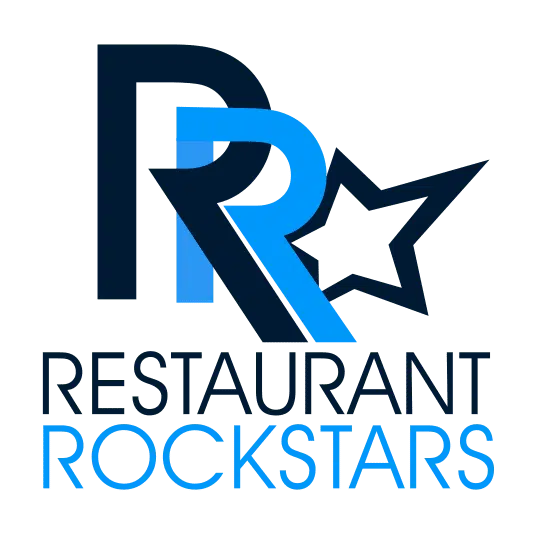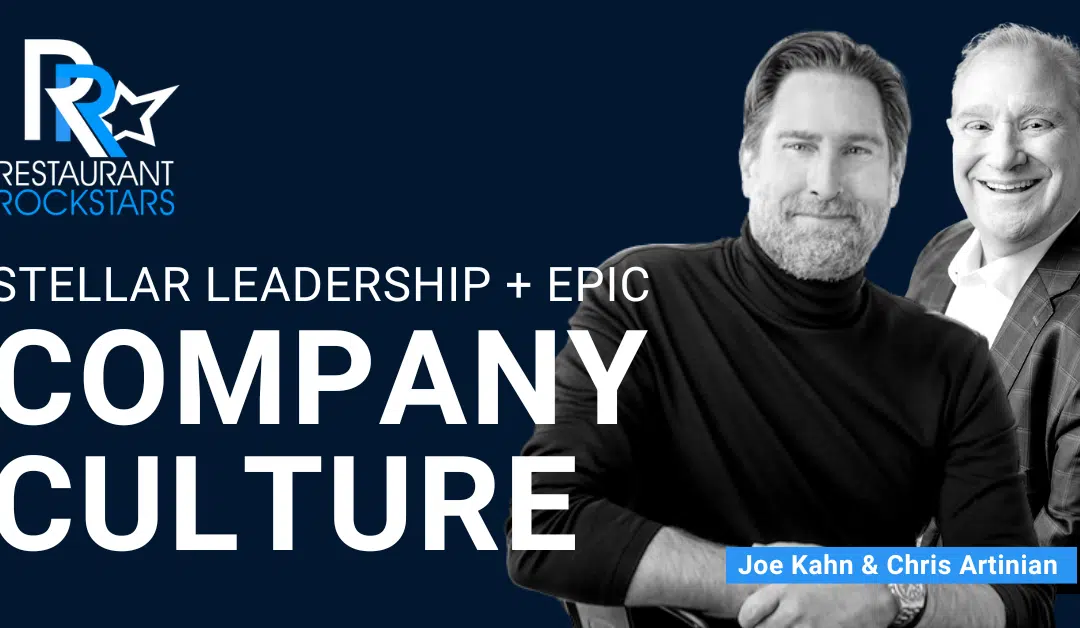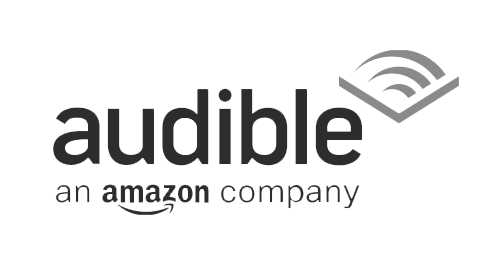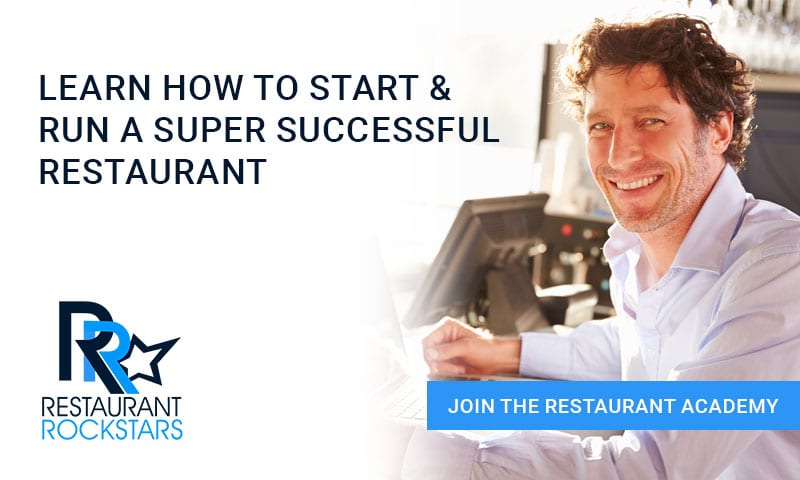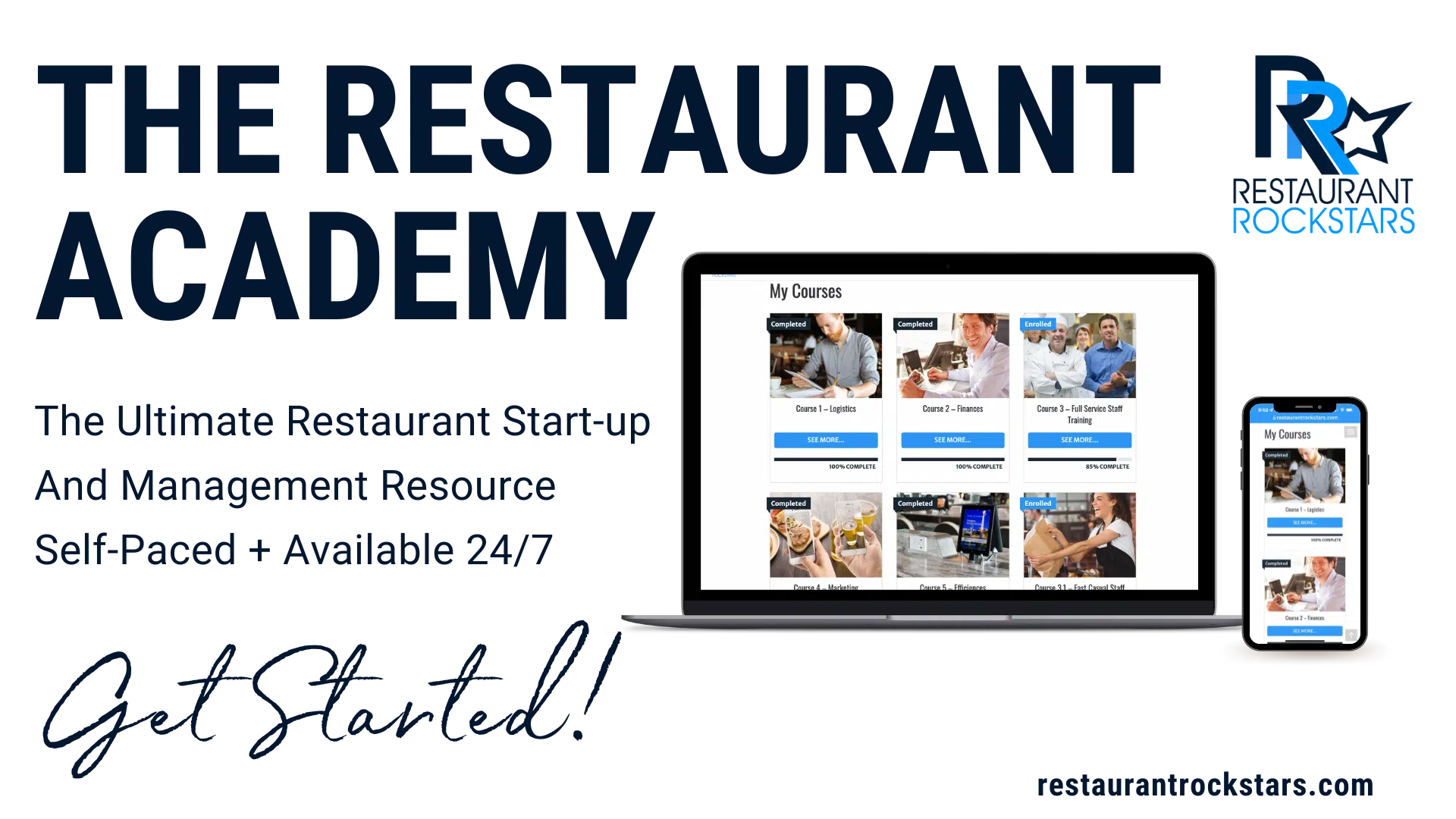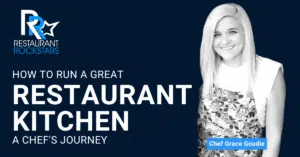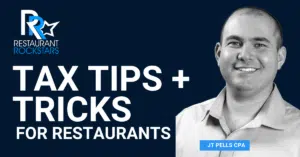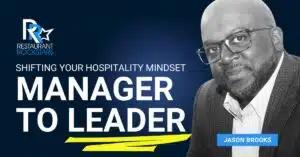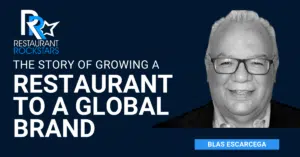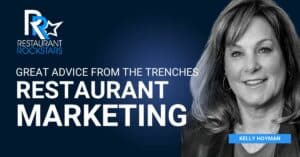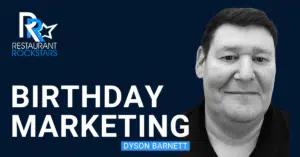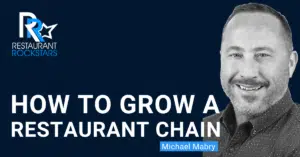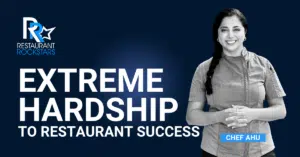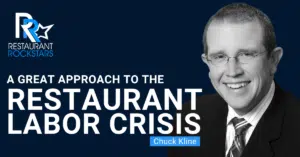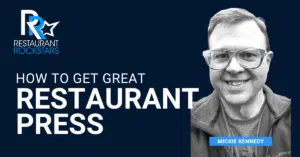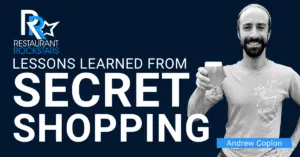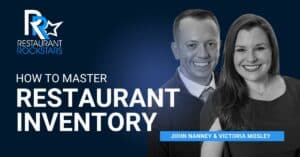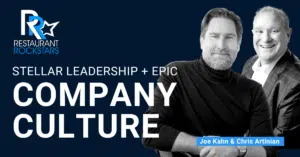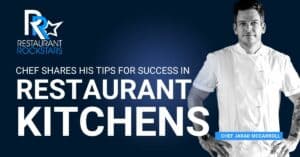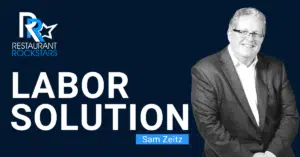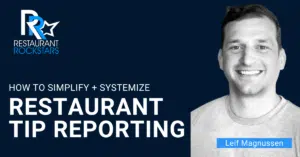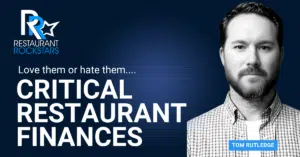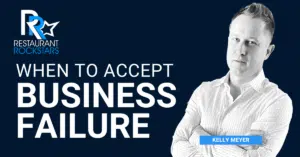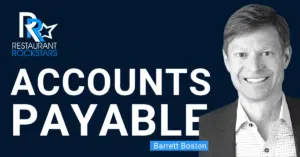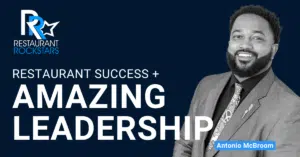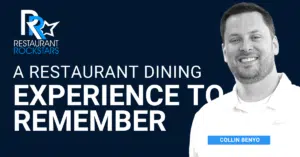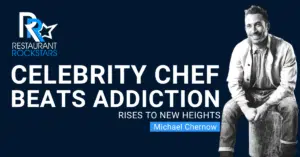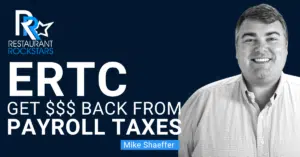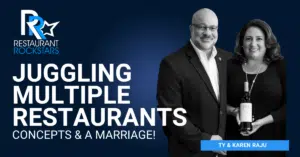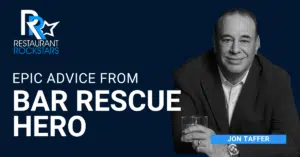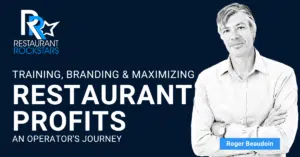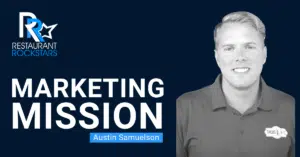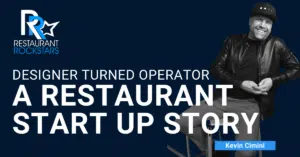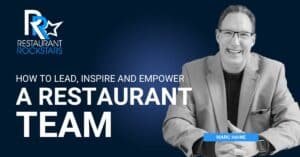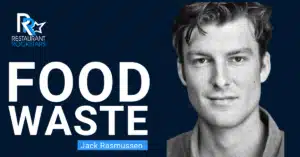Restaurant Rockstars Episode 347
How Stellar Leadership Builds Epic Company Culture
LISTEN HERE OR ON YOUR FAVORITE PODCAST PLAYER
Prefer to watch the interview?
Click the video below.
Many details create a successful growing business, but most important will always be your people.
It’s one thing to be a manager, but quite another to be a true leader.
In this episode of the Restaurant Rockstars Podcast, I’m speaking with Chris Artinian and Joe Kahn of Condado Tacos. The key to their success in growing to locations in 9 states and beyond is their company culture and how they lead. This company continues to recognize talent in their people, giving them rare opportunities to also become leaders that drive this brand forward.
Besides atmosphere and a highly successful concept based on Tacos, Tequila & Margaritas, listen as Chris and Joe share:
- Condado Taco’s powerful vision that never deviates from the core mission.
- The importance of an inclusive “Come as You Are” company culture.
- Why sourcing only, the freshest ingredients bring guests back again and again.
- Past and present challenges and the future of their operation
- The efficiencies and consistency of a common commissary kitchen
- Condado Taco’s winning marketing and loyalty strategy
- What’s on the menu including margaritas, and craft cocktails.
And of course, best practices from running a single store to growth in multiple states.
Watch or listen and then go out there and ROCK your own Restaurant!
Roger
Connect with our guest:
Joe Kahn
LinkedIn: https://www.linkedin.com/in/joe-kahn-47052b8a/
Chris Artinian
LinkedIn: https://www.linkedin.com/in/chris-artinian-3ba0b712/
Condado Tacos
Instagram: https://www.instagram.com/condadotacos/
Facebook: https://www.facebook.com/condadotacos
TikTok: https://www.tiktok.com/@condadotacos
Twitter: https://twitter.com/condadotacos
0:00
Because of the culture and the come as you are, our servers are very engaging. They’re very thoughtful. They’re very nice. They’re extremely knowledgeable. I mean, we get grades on our friendliness. like nobody’s business, I bet you were one of the top out of the entire industry. But that’s a testament to how we treat our people. They’re happy to be there.
0:22
Today, I want to introduce two dynamic operators with extensive hospitality experience and a vision. Chris Artinian and Joe Kahn are leading a company called condado tacos forward. But most importantly, it’s not just about the tacos, that tequila and the margaritas, which is a magic formula unto itself, but it’s really about leadership and development and the company culture they’ve created that have taken their first employees and really develop their positions and given them leadership within this organization. And these people are doing quite well. This is a philosophy that makes perfect sense. If you want to build a dream team staff, give them additional responsibility, empower them, and watch what they can do. This company is on fire. They’re in nine states and growing so you’re not going to want to miss this episode. Thanks to the sponsors this week. verge funding Smithfield culinary, the birthday club and the restaurant rockstars Academy. Now on with the episode,
1:20
you’re tuned in to the restaurant rockstars podcast, powerful ideas to rock your restaurant, here’s your host, Roger Beaudoin.
1:37
People go to restaurants for lots of reasons. What the customer doesn’t know is the 1000s of details it takes to run a great restaurant. This is a high risk high fail business. It’s a treacherous road and SMART operators need a professional guide. I’m Roger. I’ve started many highly successful high profit restaurants. I’m passionate about helping other owners and managers not just succeed, but knock it out of the park. You don’t just want to run a restaurant, you want to dominate your competition and create a lasting legacy. Join the academy, and I’ll show you how it’s done. Hey there rockstars let’s talk birthday marketing. It’s one of those critical, important details that either drive new and repeat business into your place or not. Now very few of us are real expert marketers. But why not a program that’s done for you that targets all the customers in your area that are having birthdays, everyone has a birthday? Why not speak to my buddy Dyson Barnett. He’s a former restaurant owner operator, he knows this business. And now his company delivers birthday customers. And it’s all done for you get some marketing that you can track where you know exactly if it’s working or not. And what the return on investment is because so few marketing dollars that restaurant owners spend is trackable. So that’s key. Dyson is pretty certain that he can get more butts in seats and not only more butts in seats, but repeat business. Once he introduces new customers to your restaurant. Those people if they have a great experience in your place are going to come back and tell their friends now that’s trackable. And that’s powerful marketing. Check it out at join the birthday Rockstar bris Joe, thanks so much for joining me today on the restaurant rockstars podcast. How are you both good. Thanks
3:23
for having us.
3:24
You know, everyone has their own restaurant story, of course. And it all starts at different ages. And they’re very interesting stories because they lay a foundation for what is to come. So if both of you would share that one at a time. That’d be great. And then how you got involved with condado tacos and then the story of the brand would be great.
3:42
Yeah. I can start. I was I think it was whenever you could get a job. I think it was 15 and a half back in the day. And first job was sizzler I remember a steakhouse. Yep. as a busboy in Chicago. And I loved it. I think I walked away with like seven or eight bucks at the end of the night. And I was basically hooked, going forward. Honestly, I never I never left the industry. I worked my way through there. I think I advanced my way all the way up to Pizza Hut where I became a server from Pizza Hut, you know, went everywhere Red Lobster, a lot of independence, a lot of different places all different positions in the restaurant, you know, server barback back a house. Consulting eventually, you know, restaurant management of course. I think I was only up to a couple of units on my own but yeah, so that’s my backstory for the restaurant business. I was very motivated from the age of whenever I got my first job. cuz I loved the industry. Honestly, I fell in love with like talking to people and walking around and helping them. I’m like, Oh my gosh, this is what life is all about. And I remember I went home and told my dad and my dad goes, you’re gonna be a garbage man. Get out of the restaurant business. Don’t do it. Don’t be a garbage man, go, go get your degree and go do something else. And I think I made it my mission for the last 35 years or so to prove them wrong. And I’m the founder of condado. So I’m very proud. Whenever I see my father, to remind him that he told me if I stayed in the restaurant business, I would end up being a garbage man. So not that there’s anything wrong with being a garbage man, I mean, probably pays pretty well, and great union, all that good stuff. But for some reason, I took offense to that. So in
5:53
your outdoor as a lifetime, but what’s that, and you’re outdoors all the time.
5:58
That’s right. That’s you smell great. No offense to that, but you know, I just fell in love with it. I really did from moment one, and, you know, all the way through, even to this day, I sometimes dream because I don’t let myself interfere with anybody in the restaurants anymore, because they know much better than, than I do. But sometimes I want to get up and help and I’m like, oh, shoot, I can’t, I can’t, you know, got it got to not do that. So I miss it a lot every day.
6:30
That’s a great foundational story. Thank you so much for sharing. Thanks. How about you, Chris, tell us about you.
6:37
You know, I really, for me, it starts really, as a kid, like my family was very, very, very passionate about food. My mother was an amazing cook. I’m half Italian, half Armenian. So like two really great, you know, food cultures. Yes. Again, you know, and so everything we did was surrounded around a meal, celebration, sadness, warning. And, and my, my mother was very passionate in the early days really took, you know, cooking classes with some of the coolest chefs in New York City years ago. And I was very fortunate enough as the third child to kind of be at that age where my mom was doing a lot of that, you know, stuff and I got to participate and you know, help her with prep, etc. And then as I got older, I did do similar to Joe worked in fast food I started I got into Burger King and sort of cut my teeth there. And then while I was going to school and and then I and then kind of started valet parking cars for our favorite Italian restaurant. And the the founders, they’re the owners who still run it today love Parma in New York, on Long Island, New York. One day, I needed some help and in the kitchen and waiting tables and and said hey, can you come in early one day, I’m going to show you how to make chicken cutlets and, and so I found myself frying chicken cutlets and then learning about how to make sauce and really kind of fell in love with sort of like the this prideful ownership of this independent restaurant, the neighborhood joint. I went on to school, and I actually started out in a different career and really, really was not fulfilled. And I left the industry and then started to look for other things. And I really kept coming back to the restaurant industry. And I went back and I started at Morton Steakhouse in New York City. familiar with the brand. Yeah, well, I’d say they’re 9094 95 for 13 An hour chopping onions in the pantry. And over a 17 year career was very, I had the great fortune of being around a really terrific culture of people that showed me the way mentored me. Anything you can imagine from an operational standpoint, to you know, employee relations and the development of those relationships inside the restaurants the value of process and structure. But also, Morton’s is private equity owns so as I grew, that company, sort of got exposure to the business of restaurants. So, very fortunately, 17 years later, I ended up being, you know, lead lead, I was a CEO, the CEO of Morton’s and, and in 2012, lead, lead, lead the sale, we were public company. So as you can imagine over that 17 year period, the exposure and experience that that I got in that business was phenomenal, and how it led me to condotto And meeting Joe was was really sort of a page out of that book in some ways. So after Morton’s I spent a few years, staying around private equity took on a few roles as a few different roles of CEO or consulting or doing some sort of due diligence on on new deals. And then I ended up joining full time a private equity firm out of New York called the Beekman group, as a managing director, and I was out actively seeking deals in the restaurant space. And I was the operator amongst amongst a group of financial experts, and professional investors, and complemented with sort of my my operational purview and sort of lead the restaurant deals. And I, we were we were looking we were prospecting for deals, I found out about condado. You know, from afar, and I was like, Well, this is interesting concept never had never been to one just kind of did some quick online work. And then Joe, Joe, Joe Kahn, the founder, and I met at a conference. And literally, like, Joe, I’ll say it was like 10 minutes in, we really understood that, you know, we shared a lot of values when it came to rest, like, you know, amazing food really focused, but but really lead with people really good people, most paramount thing, and it really resonated with me about the alignment of the vision that Joe had around condado. The alignment of people, I don’t want to go too far into the story quite yet, though. I’ll pause here in a sec. But but we connected at that level. And I just thought condado had such a great formula of a simple menu, driven around a culture of come as you are with people, led by this founder, Joe Kahn, that I thought it was a great opportunity, a great investment. And we ended up at the Beekman group leading the deal. And investing as a majority partner in 2020. And I, I got so excited about the brand. And after two years, got to know the team, I actually formally resigned from the firm and joined joined the company as the full time President CEO two years ago, just because I believe so much in the brand, the people and the concept. So sorry for the long winded No, no,
12:38
that was wonderful. Both of those stories are grounded in foundational elements of this business, which is amazing the experience that led to what you’re doing now. But the thing that really resonates his passion, this is such a business of passion. And when you’re in this business, it can bite you early and bite you hard and it just gets in your blood and you just stay with it. But it’s really about relationships, also its relationships with the team, its relationships with suppliers, its relationships with guests, all those things. And then it’s the unifying force that brings the entire world together. So multicultural, much high dimensional and authentic came across in the stories. So thanks so much for sharing. It is definitely a business of passion. And both are really great stories. So let’s talk about the founding story now of conduct our old I know your looks like the website show shows you have nine states represented here and grow out tremendous. And we’re gonna get into the menu and the food and the concept and all that. But let’s talk about the longevity, the founding story and where the brainchild came from. I always love to hear that. That information. So take us there.
13:46
Yeah, yeah, sure. Yes, funny, nine states 45 locations soon to be 50 by the end of the year. It’s an amazing story and nine years, but it really is just a testament to the culture that we try to provide at condado even from day one, you know, we have eight to 10 original employees in that restaurant where you know, your first one where, you know, you’re scraping by and and you know, all these guys believed in the culture of the restaurant and what I was doing, and they ended up being still with me, and that’s a testament they’re all in the C suites or some higher up position and able to grow this, you know, into a $200 million company. But the the origin of it was I got my opportunity when I was 39 years old. I started another concept under the same under a different name, same kind of concept. I evolved a little bit. I was very, very lucky to meet my wife who knew a guy that had a place that was going under and had a liquor license and I went in and made a deal and told him My concept and we became partners. You know, had a good year. So together and then we, you know, ended up not being we ended up separating our own ways and going away and going. We were all happy, whatever.
15:14
Okay, partnership story you don’t always see, I think I was sideways sometimes what year was that? What year would you say?
15:22
That was two years earlier than can data? So that was 2012. Gotcha. All right. Anyways. So, to start with the concept when I was 39, I met my my wife when I was 38, I think something like that. You know, I always dreamt and I would tell her my dreams. And like, if I ever get the opportunity to open a place, my own is going to be amazing. And blah, blah, blah, blah, blah. Turns out, her friend had that place. And I went and I, I, I asked him and he goes, Well, what do you want to do? And I said, Oh, I want sandwiches. And he goes, Well, what about Mexican? We don’t have Mexican and I go, Well, I don’t know Mexican. But you know what? I do know Mexican, but how about we specialize it I’m going to do just like tacos, tacos, and you guys will go, go write it down and bring it to me the next day, and we’ll look it over. And literally an hour and a half. It took me and my wife and I have a bottle of whiskey. And we sat there and she took notes. And I was just like, Okay, this is my dream. This is my dream. This is what I want. I I’ve been in this industry for 30 years now. 28 to 25 years, whatever it was at that point. I go I hate this, this and this about the industry. We’re all a number I want to make this culture that everybody comes as their own. Bla bla bla. Yeah, I want to not, you know, I was a fine dining guy most of my career. So I, I would always, they just call me the guy that either revived or ruin places. But these guys would spend like $5 million on the restaurant, then they’d put me in charge. And that’s all great and everything. But I’d look around and I’d go well, why is this a Why did you spend $20,000 On this table? I know that’s not going to bring people in. I go well, you know, it’s about food is the ambiance, everything else. So I she was typing everything down. And I’m like, I want artwork on the walls. I don’t want expensive tables, I just want like green tables and chairs. And I want it served out of a boat. But what we have to do is we have to do, we have to have the best food, it has to be customizable. Tacos, blah, blah, blah. And so an hour and a half literally, I look back at that little business plan that I did. Well, over 13 years ago now 13 or 14 years ago. And it’s still to this day is about 90% of what cambiado is. So it’s really funny to look back and go, huh. But really, I built this place because I wanted to build a place for that I thought I would want to be a part of and to go to. So I built it turned out great partnership didn’t last but I I got really lucky. Two years later, I was working and I found two great partners. And then I took all my experiences from the other space and went, Well, that was great. But now I need to make it even better. And so I changed a bunch of stuff, molded it into, you know, something that I thought was even better. And then voila, cambiado, nine years later, 45 restaurants in. It’s an amazing story. But really, at the end of the day, I wanted an exciting environment that I could serve affordable food craveable food, clean food high ingredients for an affordable price, I wanted a place that you could come to two or three times a week, and not get bored of it. And so, but I also wanted people who were there to work for me to enjoy their jobs. So I’m like, you know, the commas here are kind of made it and what I found was when I was working in the industry when I was in that stuffy uniform, and I was all this I wasn’t myself, I don’t feel good. I don’t feel like myself. You know, so anyways, do this. And you know, it’s not like it just happened overnight. I mean, I a lot of things happened in between, but it was great. Everything poured out of me. And you know, it’s just fantastic to see 45 restaurants and 1000s of employees, the beginning values of condado that I started the culture. I mean, I This is unheard of. But when I go to a restaurant opening, I have at least four or five employees who have been with me three, four or five years at some of them I just you know I can’t even remember still because there’s so many people out there coming up and we’ve met once or twice or whatever, but they come up and they go you know, this job has It’s changed my life, I have never been in this industry and I shit you not, I don’t know if you can swear on this podcast I just did.
20:06
But yeah, let yourself go.
20:09
It really is a testament to the culture that these eight 910 guys that have permeated through the organization has passed down to every employee, even the long Jeopardy employees that have been with us seven years and eight years, you know, it’s all passed down. And then we all believe in this unified thing of come as you are, be happy, you know, be happy at works, take pride in your work, work hard, and you’re gonna have these great opportunities. I mean, now that the point where, and I have been for several years, after the first couple of years, I’m just like, I want this thing to be, you know, national, I want to be the premier company, I want to change how you treat it in the restaurant industry, how you can make money and how you can get ahead without having a big college degree and all this kind of stuff. And, you know, I would I would probably say, out of the 10 employees, there’s probably two that have a degree and are millionaires are going to be millionaires. Soon. So you know, it’s a great testament to vision of what you want, and finding people better than you that believe in you to execute. What is happening now? You know what I mean?
21:24
Let’s go back in time to the beginning. And I’m sure you can remember every restaurant, every restaurateur has crazy stories. What were the big challenges and pain points? What kept you up at night? What did you think, Oh, my gosh, I’m not gonna get past this. And then you fast forward years in the future. Now you can laugh at it and say, that was really nothing. And look where we’ve come so far. Does anything like that strike? Either of you, gentlemen?
21:47
Oh, my God. I mean, I’ll go until my horror stories. And I’m sure Chris has a million too. But I mean, in this business, there’s just so many failures all the time around you. It’s, it’s how you react, I mean, I, I’ve lost people that I thought were the best. And I’m like, Oh, this is not gonna work. Or there’s so many challenges. I wish I could pick out one. I mean, I’ve, I’ve shut down restaurants because I failed during service, I would shut down my restaurants in the middle of service, apologize, give people drinks, say all your foods on me, we did not do this properly. Give us another chance, you know. And that, to me was a big failure. And I’d go home and go Oh, my God and pull my hair out or, you know, whatever it is, but I got back up the next day. And I’m like, if I’m going to fail, I’m going to fail hard. And then I’m going to come back and I’m going to do it right the next day. And the people around me really rallied and came with me. And that’s really what made condado they all rally behind us together as this company and went and we came through. But yeah, I mean, I’ve lost partnerships, I’ve lost deals, I’ve lost everything. I mean, I fail. I failed all the time. I that’s what makes you I think in my book, I don’t know what you think, Chris?
23:01
No, I, first of all, well said and it’s like, you know, Spoken like a true founder and a dreamer. And, you know, I think there’s an 80% failure rate in business for a reason. And it’s, it’s hard to, you know, it’s not, to Joe’s point was never just about the taco, or, you know, or, or even better food, you know, a lot of people could decide to put a better product on the menu. This business is so people intensive, and that’s, and that’s why it’s so hard. And I think that’s, that’s the struggles that I remember, I, I have always touted myself as the great replicator of brands. I am, I have always had the ability in my career to take a dreamer, like Joe, that has a vision that that gets gets it started. And I am really good at sort of taking the ball and helping replicate that in a to, you know, to restaurants to be restaurants, five restaurants, 10, restaurants and beyond. And that’s, that’s what I’ve done, you know, over the years, and more of a sort of, sort of from even though I had independent roots, but really, in my mature years in the restaurants has really been corporate structure. And I have the great fortune of working with folks like Joe that that I can able to take the dream of which I couldn’t come up with some of these ideas it you know, that locked in a room, but I’m pretty good at the cultural piece and carrying that goal and and engaging with people and getting the most out of people which is really what excites me in this. This business. If you don’t want to make a difference in a person’s day you’re in the wrong industry. And when And I mean that starting with your team members, and Joe says something and we talk about it a lot as a group and our COO Johnny, who was Joe’s, Johnny Zilla, who is Joe’s first employee really leads this in our organization. But, you know, we say Conoco that whether you’re here one week, one minute, one, one year, 10 years, or 20, we want you to look back on that experience is the best time you’ve had, as one of the best experiences that you learn something, it took away something, because so many people come into this industry in their formative years, and not sure what to do with it. So it is the toughest part is why it’s such a high failure rate, because you got to get people that believe and align, and then then share your passion for what you’re doing, and then to execute it. And those are those that are growing pains that I think still to this day, keep us up at night. But that also, we’re so passionate about about getting right, because we know those of those that are folks, they’re going to help us you know, tell that story, and execute and, and, and by us, helping them better their lives in some way. You know, large or small, they’re, they’re gonna it’s going to translate to the guest experience, and be pretty special.
26:21
That’s definitely beautiful. Let’s talk a little bit about roles. Okay, I know you’re president and CEO, and Joe, you’re the founder and whatnot. Is there any overlap to what you to do you obviously collaborate on the business on growth on future marketing strategies, all that kind of stuff. But, you know, what are your roles? Specifically? What you know that that cliche stay in your lane, you each have your own lanes? What are those lanes?
26:44
Yeah, I mean, I’ll tell you listen, Chris, is the Chris is the poof, how can I say this, he’s more than just the running back. He is the guy that takes the ball and just runs with it, and gets everything put together. I’m the dreamer. The great thing about Chris, and I’ll just tell him really quick, please, he is not a typical CEO, and President. He thinks like me, he thinks like, he wants my help. When it comes to all this, he doesn’t need to ask for my help. He’s not the majority anymore. I’m still the largest stockholder. I’m not the majority. So he could go, Okay, I don’t even want to listen to you, Joe, and blah, blah, blah. But what he knows is, I’m the founder, I still have a vision, people that follow me. And he supports what I do. But we talked about everything. Chris lets me in. I sit in a lot of, you know, the meetings, the big meetings, of course. And he relies on me to say, hey, is this what condotto should be? And I go, Yeah, or I say, No, this is not, this is not us, I want to tell you. So I spend a lot of time working with Chris, but he’s really the runningback slash quarterback, whatever you want to say that really, you know, takes all these different personalities. And then at the end of the day, he has to make the big decision. It’s just, it is what it is. I mean, there’s you know, there’s been tough decisions that he’s had to make that me, Johnny and him don’t all agree on. And at the end of the day, we will sit there for hours, we will sit there for a week, we will sit there for two weeks, until we finally get to a point where we’re all like, Okay, this is what we can live with. That’s very rare, because we’re usually all on the same page. But I mean, if there’s something we’re not scared to, you know, talk about why it’s wrong, or why it’s right. And voice our opinion. At the end of the day, we all care about condado. But he’s the big architect on the dreamer. I still say I have a very good pulse on the business. I’m there a lot. I made a ton of meeting. So now like I go anywhere, but at the end of the day, Chris really does all the hard work.
28:57
You know, I want to dream, Joe, that’s very kind. And I appreciate that. I will say that. Joe is the absolute DNA of Coronado. And one of the one of the biggest values that that condado has is the fact that Joe is still involved. You know, we’ve been doing this a long time. You know, I’ve worked with other brands, I’ve worked with brands with the founder without a founder. That’s still that’s still involved. The advantage we have of having Joe’s original vision is that I can real time gut check. Does this feel right? Is this was this the reason why we started this? Because what’s important to me to really replicate a brand in a sustainable way is are the values that started this brand, still intact, and are we making our decisions whether it be around our people around our food or on our menu around our building around how we’re you know, however, we Your strategic vision does it fit within the core values, that that was your idea when you started this. And, you know, I love the fact that we can wake up and understand the why of why condado got started. And I have that with a founder. So Joe is absolutely Chief Innovation Officer. So he gets very involved with our food, and is very involved in our marketing, and really works with me on the culture. And to Joe’s point, I am the strategist, if you will, to help put in structure, sort of, how do we replicate this in the most effective way possible. And I work closely with our COO who’s just done an amazing job of creating systems and operational execution that is just exemplary. I thought I was a pretty good operator coming through this, Johnny’s the best that best period in the industry is as far as I’m concerned. And so I have an innovator, and a culture guy that understands in Joe and Joe Kahn and understands exactly the why behind what we do. And I have I have an operator that was there day one that knows how to do it from scratch and execute it at an extremely high level. And I get to be sort of a baton leader, if you will, these guys run these guys are the show I mean I am I’ve been doing this a long time I really enjoy, really enjoy, what they’ve built in is I’m really enjoying helping them for lack of a better way to put it, show them what condado can continue to be with the dream that the that Joe has had, by you know, introducing it to new markets in a way that keeps the brand preserved. And that’s that’s my that’s my job with a lot of help from those guys.
31:52
Well, it sounds to me, everything you’ve said so far leads back to your people, your people are your strength, your people are brand representatives in all these states, your people have you talked a lot about culture also, which seems really, really strong. You don’t just have a mission statement, you have a true culture that defines your brand that everybody feels that everyone is pulling toward that common goal. But you still need to maintain consistency across all those locations and across all those states. Have you had well, are any of the original employees in different states now running the different stores? Or are they district managers and let’s let’s talk about leadership and how you develop leadership across the states and across the chain get big flavor with little labor with smoking fast from Smithfield. It’s fully cooked or smoked proteins, including American barbecue staples and global flavors. Everything from ribs to pull chicken to brisket and barbacoa are all authentically slow cooked to perfection. It’s so delicious. Your guests will never know it wasn’t smoked right in your own kitchen. Now you can add barbecue to your menu without adding a pitmaster to your payroll. Visit Smithfield culinary.com/smokin fast that spelled SMOKENF A S T. Listen, you’ve heard a lot of noise about the ERC tax credit. Why is it such a big deal, because your business already paid a ton of money in payroll taxes, and more than likely you qualify to get a ton of money back. Now if you haven’t applied yet, I’m telling you drop everything, drop what you’re doing and figure out how to get it done. The truth is, and I’m speaking from experience here, it’s super easy to get the money back if you let an expert do the work for you. Now get on this before the government either changes the program or runs out of money. I got hundreds of 1000s of dollars back from my restaurant and it literally saved our business. Now you may have heard it may take many months after applying to get your money back. But that doesn’t have to be the case. If you need your ERC refund sooner to run your business or to take care of some much needed projects. You can speak with Karen Garbutt, the owner of verge funding group, about a bridge loan or other working capital. Now whether you wait for your check up for a bridge loan or other working capital, it’s likely you have a significant amount of money due back to you so don’t lose it. Now go to the show notes for this episode on our website and use Karen’s calendar link to set up a time to chat with her personally about how much money your business can get back. I’ll talk
34:30
the beginning days and then I’ll let Chris take and go there but the consistency thing is, is was number one on our minds when I decided we are well when we have one restaurant. I learned from McDonald’s I’m like I want to go to condado every time and I want it to be the same food. Right? UPS has to be consistent has to be the same so that was day one. I mean I would throw out gallons full of salt offices that we would make for the day, we were that busy. We were five, five and a half million dollar little restaurant and the short north and we would have to make things and gallons, sauces and gallons. I go around and tastes and that’s, you know, 8am in the morning and somebody didn’t make it right, well, it doesn’t get doctored, it gets thrown out. So you have to restart, or it’s just not on your menu for the day. And then you have to explain and I’m like, I’m not doing that. So sure. I was very big on consistency, safety, consistency, knock on wood is the worst thing that could happen. But I actually made sure on the consistency part, and a lot of the guys that that were with me in the beginning, are the higher ups in the company now, you know, the, the, the, you know, culinary managers, and you know, all these guys. And so that foundation of building those armies, there’s a lot more because there’s, you know, your two employees that have been there eight years, we don’t call them the OGs. And there’s seven years and they’re not DOD, but they are, you know what I mean? Sure, a lot of those guys permeate themselves through the organization, but so that was just like, beaten and beaten into you. And there’s no way that these guys are not going to be consistent, because they went through hell with me. I was not fun to be around. I was not a fun boss. They believed in my vision. But, you know, there are days that we didn’t look at each other in the eye, because I was like, This is what we’re doing. And so we’re friends and you conform to what I’m doing. I’m not gonna you know, kind of thing. So they were very good. They survived. I call it the i My last name is Khan, the Wrath of Khan days. Okay, so I’ve those and they, yeah, I learned, but that’s how you have to be in the business to get here and get everything done. And, you know, I love them to death. But I just wanted to be this this thing, I had a vision. So that’s not a problem. Now going forward, the more we expand, I’ll let Chris take it. But we are. We’re a pretty big organization at this point. So I mean, you know, we have a lot of regionals that have been with us a long time and our COO and we have, you know, a bunch of assistant regionals. And but I’ll let Chris speak to the making sure everything’s consistent across the board.
37:11
Yeah. Thank you, Jeff. So just to pick up where Joe left off, is that you know, a lot of those folks that were there from the beginning to answer your question to, or one to one is our COO. So in the C suite, for sure. One another one is our Vice President of food operations, who runs our make fresh sort of production at 26,000 square foot facility where we do everything from scratch. And he, he was a he, you know, started with a five gallon bucket and a piece of plywood and a chef’s knife, and now is running a facility that people would absolutely laud and envy today. And
37:53
don’t forget, he does the he does our, our own logistics as well, just logistics distribution. That’s very important with the scratch kitchen, because everything that is made, is made like it’s made in your kitchen and delivered to your restaurant within 24 hours, which is unheard of. So
38:13
basically amazing, right? The Commissary Kitchen. Yeah, that’s awesome. Yeah, it is tremendous.
38:20
So you know, Jan Stewart or VP of food operations was within a matter of weeks, hired, you know, in the early days, so to culinary manager, to our beverage manager, to our facilities, folks. So those original folks permeate the company still, several of them are on the training team today and help Alyssa runs the art department. Alyssa Alyssa Martin runs our art department and has been with us for years. And so, you know, these are these are, you know, the original folks that that really are the foundation of the culture and then what our what our COO has done certainly with with Joe support over the years and mine over the last couple years, taken the ball that and really driven the organization to drive personal and professional development. And so with with all these openings during your opening up, you know, you know, ego from opening up one to three to five to you know, you know, we’ll be almost 12 new openings this year, which is which is really exciting. You need people.
39:35
Oh, absolutely. Yeah, those are gonna go there too. In a few minutes. I keep going
39:39
66% of our promotions last year were internal and and that does not happen without you know, a tremendous focus on on development programs and getting people excited about the brand. They get excited about their growth and getting them to stay on because they believe and they’re they’re feeling part of. And so these these folks that have stayed from the beginning believed in Joe’s vision, and they’ve been the quarterback, so to speak, or the, or the messenger of this culture, and because they’re in so many different positions, you know, in the four corners of Kannada, we’re very fortunate to have so many mouthpieces of our culture and where we start in the history, certainly led by Joe and our and our CEO, Johnny Zilla, and the supporting cast. But it really creates this place where, you know, boy, that if I, if I really do X, Y, and Z, I could actually manage X, Y, and Z and I can actually grow my career here. And as excited as we are about everyone growing their career, we’re still perfectly okay is that if you just have a great experience with us, and, and learn and grow in any fashion. And if the restaurant industry isn’t for you, and you move on, at least you can look back and condado and saying, Boy, that was a great growth opportunity. For me, I really grew as a person, I learned a little bit about business I learned a lot about working with people working with with, with guests in the hospitality. And, and that’s driven because we have so many people that have tenure here, but also so many people that have grown their own careers here, which really kind of permeates that sort of tenure and retention.
41:27
So now you’re talking leadership versus management. And I think there’s a huge distinction. And it’s kind of unfortunate, our industry throws around that word manager so often, and it’s the title, right. And just because you’re promoted to manager, or that’s your title doesn’t mean you’re competent, or experienced to be the manager. But a leader is someone one leads, by example, recognizes talent in other people, nurtures and develops that talent gives them opportunities to grow in an organization gives them room to make mistakes and fail, recognizes and rewards that performance. And like you said, if you just want to make the tacos, and you want to stay here forever, just making the tacos, that’s okay, too. But that’s leadership, right? And I’m hearing that crystal clear from your organization. And that is really, really strong. I mean, when you’ve got that, that that is part of the culture, also of the organization, for sure. Just a testament to how you’ve created this thing, the vision that remained true and solid doesn’t deviate from this as us like you said, Joe. And that is that’s, that’s really powerful. There’s a great takeaway there for our audience. I’m really glad you shared that’s, that’s yeah,
42:36
thank you for saying that. Because it’s very true. It’s it’s not abundance in this industry really isn’t. But it’s, we’re very proud of our people. We’re very proud of how far you want to go. And we’re very proud of, you know, our pay our pay scale. I mean, we pay probably in the 90th percentile, if not above of major companies, everywhere from salary down to line cooks, I was paying close to 20 bucks an hour, nine years ago. Oh, that’s always been. Yeah, that’s always been our philosophy. And I made Yeah, that’s a shitload of money. And I opened up 45 of these. So it can be done. People in the industry, take note, if you pay well, people will work hard for you, there’ll be less turnover. And you’ll you’ll make yourself a lot of money. So it can be done. But you know, that’s that’s we, you need a livable wage, you need to feel like you’re part of something when he come to work. And you need to feel like if you want to stay with that company that you can advance and there are so many opportunities as big as we think, Well, I don’t think anybody thinks we’re that big, maybe people outside of our organization, we still see ourselves as a baby in this industry, 45 restaurants, 50 restaurants, bro, what we want to achieve, we’re a baby in the industry right now. And to be that legacy company, it’s going to take, you know, a good number of years to make sure that we keep doing what we’re doing and growing at the same time and making sure that our culture is intact. Because these great brands like In and Out Burger and McDonald’s and all this. They’re all built the same way. There’s you can go back and I bet you my story is I is identifiable to them as it is now you look at other brands that have been around for a few years and have gone. I bet you that’s not in that organization. They don’t care about culture. They care about churn and burn. And, and to me, it’s what Chris said in the beginning. It’s the people. It’s a people business. If you can’t take care of your people to take care of the people that come in the restaurant. You’re just not going to have a restaurant. So what is right,
44:50
let’s talk about onboarding new staff and indoctrinating them into this culture and training and recognition and rewards. How does that work across the Oregon session,
45:01
I could take that job if you like, the so so. So we do we have a full on training department as you can imagine. So certainly have a director of training, and a supporting cast that that not only that not only focuses on, you know, opening new restaurants, but also documenting every process we have in the organization, the most valuable thing to really bring someone on board is, we really think it starts with, you know, orientation. And the thing that the thing that we do is as basic as that sounds, is that the most important thing is that day one, you’re truly welcomed here at condotto, you understand who we are, what we are, you are met with our mission statement, or in our core values, you’re met with exercises that help you understand the reason why those are developed, and what’s the meaning behind them. And that’s the foundation of what we do. And, and every every piece of training material, and every piece of communication today goes through the lens of our of our mission statement, which as our mission statement can be a little lengthy. But at the end of the day, it’s about, you know, come as you are and creating an experience as unique as you are. And we use that lens in everything that we do, and how we communicate, how we even do development programs, we want to use the same language that we’re all accustomed to. So everyone truly understands where we’re coming from, when we are communicating something or the spirit, or communicating the spirit of a new initiative, or communicating you know, anything that’s that’s going on in the organization, we really tried to look through the lens of our mission statement and our core values. Ironically enough, the the acronym is queso. And we certainly sell a ton of Kyoto
47:04
perfect. Yes. Which stands Perfect, perfect fit.
47:09
Yeah. And it’s exciting because it really it stands for if he just just to share with you a quality, unique empowered service and opportunity, you know, yeah, that’s great, thank you for going through each one of those. But each one of those words really mean something in our organization, when it comes to quality and, and the people beyond the food, right and uniqueness, the celebration of the people, the uniqueness of the meat of the menu, and so on and so forth, and giving people the power to grow their own careers, and make a difference in someone’s day, in the guest experience, etc, etc. And we really work hard. And we’re not perfect at it. Because I don’t know if we ever will be to be honest. We really try to hold ourselves accountable to this mission and core values and gut check ourselves regularly and saying, Are we are we really holding up the values that we went out there and said that we’re going to do and we ask where we ask our team members about it. And we really try to, you know, whether it be quarterly meetings with our general managers and other managers really try to engage at a level that ensures that we’re supporting that message.
48:27
I’m not hearing that you’ve had much of a challenge with the labor crisis that much of the industry has complained.
48:34
The I wish I you know, it’s I wish we were insulated to what everyone has, you know, you know, has been challenged? I, you know, no, no doubt, and just to be very transparent during COVID, you know, we experienced some of the highest turnover in the industry. Despite all the great things, I think we do, you know, for several different reasons. One, there was a lot of things changing in the world, people, people, you know, taking stock in their lives and wanting different qualities of life or different experiences and trying different things. So, or just not, you know, returning to work candidly, whether, depending on the time we were going through, so there is no question. We had those challenges. But what I will say were everything that we’ve spoken about here, saved us is that I think we had an advantage over most, because we had a group of people that were aligned with us that said, if we can get open and be the first ones open, we can serve our communities and that’s Boy, that’s something pretty special it is and and to have a collective group of people do that. And these types of people attract like, like folks, so While we absolutely battled turnover, we had a core group of folks, that was the nucleus that really kept, kept us together, allowed us to be open. You know, more than many of our peers, candidly, whether it be more days of the week, or open period, or just even more, more more meal periods. But it was because of the foundation that we had. And that continued to attract people that we many others had to reduce hours and or end or not get open certain shifts. And despite the battle we had with, with with hiring like everyone else, we were we were highly successful. And I have to just, you know, tell my operations team is doing an amazing job of every day figuring out, okay, what are we challenged with today, and we were all in it together, there wasn’t a time that you couldn’t pick up the phone and speak to a manager immediately or candidly, a senior member of staff, or candidly, if you needed to a dishwasher for that matter, proverbially. But we were in this together, and we’re solving problems together. And I think that’s what helped us maintain the folks that we did have that kept the lights on during
51:19
those times. Yeah, I’ll add to that really quick, just because I’m so amazed by our organization, but I mean, it was crazy. I mean, if you if you remembered, everybody was cutting staff. And then you had to cut all the managers pay, because nobody knew what was happening and you cut, you know, everybody, or you had no servers and blah, blah, blah. Well, these guys band together, and I gotta tell you, within a month, we were doing so well, with just to go and serving our communities that we were able to get everybody back. That was on leave. I don’t know if it was one month or two months. I can’t remember. But it was a lot faster than 99%. Yeah, we paid all the back pay, we paid them hazard pay, we did all this stuff. I mean, it was fantastic, that we were able to do that. Because of that core group of managers that were like, no, no, no, we got this, we got this and really helped us through the whole business. And, you know, ended up being great, because some of these guys, you know, to go specialists were making $48 an hour. That’s what picker averaging. Right? Then all of a sudden, people were like, Okay, well, government assistance, I don’t want that. Let’s go back to work. I can make 50 bucks an hour or whatever. So. But yeah, it was it was a very difficult time. But I think our culture did save us. Yeah.
52:48
Were there any pivots that came out of the pandemic that you continue to use today that are now huge parts of your business? I mean, you mentioned to go obviously, but then online ordering became huge, and delivery became huge. And all these other things when you had to shut your business down physically for many states did for you know, a large part of time my state included, and then even in our state of Maine, they enacted alcohol to go is now allowed, and they’re continuing that and that’s been a huge boon to business, you know, when you put cocktails in a sealed container and sell that with a to go item now it’s it’s wonderful thing. Yeah,
53:25
yeah, we were less than I think Chris keep me on is three or 4% off premise. Before we shut down in 2022. Now it’s about 30% of our business. So we picked up a lot of that off premise and everything else, but I’ll let Chris tell all the
53:43
pit. It makes me laugh, because that was the words now we hate that word. I know it’s true. But But in all in all candidness it was the word we use every day, every minute and I think we can I think we all you know get the sweats when we hear it because that’s only Democrat the state was like, are we gonna pivot again, we got a pivot, right? You hit it on the head, if it was if it wasn’t going from to go, you know from in house to go to adopting technology at a rapid pace and fully integrated with online ordering third party delivery. You know, paying at the table remote printers, remote, remote, pos kts systems, anything that that created anything frictionless. We, we were really proud. That one our collective team, including our tech, our tech department, really kept us in the game of saying alright, here’s that. Here’s the tech we need. Let’s go out and get it. Let’s, let’s learn about it, get the right piece of technology, then deploy it and do it in a way that you know, didn’t slow us down and And we can try to keep up with this ever changing pace because we really knew the, we really needed the the ability to stay nimble in this environment, because it seemed like every day that laws were changing, in the times were changing, if you remember those early days of COVID, we just wanted to be able to be in a position to be as flexible as possible. So we adopted just about every everything you read today, and restaurant news, or, or any, any of the industry rags about, you know, online ordering, or or, you know, electronic, electronic waste management, to kts systems to remotes to, you know, AI interacting with the app. You know, we are, we are in the process of of trying to get a test coating with robotics, I mean, it’s a, it’s become a real mainstay of what we do without sacrificing quality, and allowing us to be more efficient and continue to invest in our people.
56:06
Let’s go to your menu, r&d. Does the menu stay constant all the time? Does it change? Are there LT O’s? Are there, you know, seasonal specials? What do you do focus groups on new menu items, you got an executive chef that keeps coming up with ideas? Tell us the whole picture there?
56:24
Well, is everything you said? It’s no it’s a lot of first of all, we we do not change our menu, we’re very consistent. We have our I think it’s twice a year meeting where it’s, you know, the workhorse flower, star, dog, whatever it is. We do our quarterly specials. We’re all about innovation. So we’re always innovating. You know, twice, I work r&d with Trey, I’m constantly on the phone with him. He’s constantly calling me saying, Hey, this is what I’m coming up with. And, you know, this is fantastic, because we he is constantly doing something to eventually add on to the menu and innovate something. So I mean, we try not to mess with our recipes as part of the consistency. But you know, listen, jackfruit, nine years ago was very popular for us. And we were the first one to have it. And it was this miracle fruit. And I love vegetarians, and I love to eat clean. And it served us a very good purpose. But right now is a very small percentage of our menu. And it’s been nine years. So you know, it’s about time to figure that out. So now he’s coming up with, you know, alternatives for something like that. But yeah, we spend a lot of time I say, if you’re not innovating, you’re dying. I mean, it’s really true. Even if it’s just one onion, making that one onion better. A better onion itself, per se is stuff that we freak out over, okay, the yellow onions. No, they get slimy, they get this, we got to switch from yellow to red onions. We’re obsessive about that stuff. So cut it up, test it, it takes months, but we do testing everywhere, constantly innovating, even if it’s ideas that we know, are not going to stick like I brag that I make the world’s greatest burrito. They call it Joe cons world’s famous burrito, that I served my family twice a month. I love it. I couldn’t execute it. And I did this big tasting on it and everybody hated it. And I was pissed off. Because that has gone on the menu, I get it. But we just throw stuff out there, we want to remain relevant. You know, we don’t have a bowl on our menu, when we started now is a huge part of our menu, you know, our rice base or kale base bowls. Instead of the tacos. So we’re constantly innovating. There’s a lot of testing. And yeah, yeah, if I answer that properly, I’ll let Chris answer the rest if I missed anything,
58:49
no, I think you nailed it. I mean, it’s it’s something we’re very passionate about and, and thread the needle of innovation and new and introducing new we do we do on a quarterly basis introduce a new LTO and it’s a new Taco dip, indoor Margarita and usually one of each, just to keep things fresh and see if we find a new permanent menu item and but we also know that our you know, our concept also was built built on a build your own taco or bowl. So you can come in and create your own as well. So between the features which we create, which we really sell the majority of these days, you can come in and build your own as well.
59:34
How about the bar? You’ve got a craft cocktail program, it gets seven flavors of margaritas. You got some draft, modelo and Bud Light. What percentage is alcohol sales in a typical store versus foods?
59:47
It’s big. It’s 35% Is that right Chris?
59:51
Are for wall beverage percentages, you know as really lived at 35% Sometimes a little bit stronger, which is just just extremely healthy for bottom line for a concept like ours. It’s really, really exciting. We get a lot of you know obviously margaritas in our name you know CANADOS tacos to tequila margaritas. We get it but it’s really about fresh flavors. You know when it when you drink a house mark from us you’re not you know tasting cheap syrupy, mix it’s fresh mix. And we’re so proud. You know that, that you know you come in and joy, great Margarita with a great tequila and fresh ingredients and save the hangover as a result. And and it’s a big, it’s a big part of what we do. And the experience is, you know, come in, get a dip, have a taco and or bowl, and a great Margarita. And we certainly have a wide variety of beverages beyond the margarita but we sell 85% of what we sell is margaritas and every variation you can imagine, which we get a lot of credit for, which is exciting for us. Yeah,
1:01:05
I get a really good sense of the vibe and the ambiance, just from your website. I think I’ve always said that a great restaurant website really gives you a taste and a flavor of the restaurant before you even walk in the door. And it’s a calling card, and it’s something that compels you to try the restaurant and you guys have done a very good job with that. Would you say that? Well, why don’t you walk us through a first time visitor walking through the door of any typical condado location? Sight Sound smell smells? What what’s hidden? Yeah. Well, you jaw.
1:01:34
Yeah. Now, listen, when you walk into condado, it’s all about being in an exciting environment. And hopefully, which I’m very proud of. And, you know, if we execute it all the time, I’m pretty confident that we do most of the time knock on wood, but you know, you’re greeted with a friendly person at the front door. And, you know, it’s a casual vibe, but it’s exciting. There’s, you know, music that you know, loud music, it’s a lot of energy. And you’re looking at these big colorful walls. I mean, we have our own art department that we’ve had since day one in condado it was one person before and now it’s our Department of five plus we I think four or five, something like that, plus, we have 12 artists that we hire, in the location that we go to. So if we’re in Michigan, in the Michigan area, we’ll find mural artists. And then we create these vision boards. And we put this great artwork on the walls that all tell a different story. They’re all different in each condado. But you know as condado because it has all the you know, representing characters, but it’s really the theme of the restaurant. It’s what makes your condado that you go to yours, it’s your neighborhood, it tells a story usually about the area and what that area was, you know, in some areas, it’s about, like our Polaris location, Polaris is about the stars. So if you come into the Polaris location, you’ll see us all a space theme and galaxies and all this great stuff. But you’ll see our characters in there doing the space moonwalk or whatever it is. So that’s it’s really exciting. Walk into looking Dotto, you’re gonna smell a lot of chips, because we go through 1000s of pounds per locations, all we do is we fry our chips and hard shells eight hours a day, just standing there over there, you know, doing that. So you’re going to smell that. And hopefully when you get there and you sit down what really is going to permeate with you as it’s so comfortable and easy. And you don’t have this person coming over to you that doesn’t feel good about themselves. They’re not in a uniform, a shirt, a tie a blood. Hi, my name is Joe, I’m here to serve you. And half the time they’re looking over you are there talking through you. And you know how it is when you go to these places that have no passion and nobody cares about their job. I think because of the culture and the come as you are. Our servers are very engaging. They’re very thoughtful. They’re very nice. They’re extremely knowledgeable. I mean, we get grades on our friendly list friendliness, like nobody’s business, I bet you were one of the top out of the entire industry. But that’s a testament to how we treat our people they’re happy to be there. And they don’t have spiels and they don’t you know my name is this they’re just themselves. They have rules of course we go through and do all that kind of stuff steps of service but they’re really themselves and you’re so you’re going to be in an environment that’s high energy. That is very colorful. And you’re always when I started condado I wanted to with my murals paint, so whenever you came in, you’d always notice something different. And it’s usually how it is there’s so many easter eggs and nuggets in Nice pictures. I mean, these, these artists are outstanding, what they do and Alyssa has been with us almost the entire time. I think she started. At the end of the year one, who is now in charge of our art department is phenomenal. And she is the one that looks over everybody and takes her other people under her to do all these different restaurants and make sure that, you know, it’s it’s condado approved. Yeah, and there are pieces of art. So,
1:05:31
you know, it sounds to me that aside from the vibe and the feel you get when you’re dining in the candato sounds like this a huge marketing component there with all these murals and stuff just showing up on social media and paying free marketing for you guys, it just compels other people to try out. Yeah,
1:05:49
I mean, I think so you know, we’re in the we’re in the BuzzFeed. Yeah, we’re in the BuzzFeed of your Insta, Instagram and all your social for sure, we’re very, very colorful, even our food is so colorful and pretty, you know, it just begs you to do that. But that wasn’t the intent. But you know, luckily, we get it but you wouldn’t be blown away, if you go to a condado is definitely an experience, we say for 20 bucks, it’s the best experience you get out there. I mean, that’s what we are our average taco dip and a drink, you’re under 20 bucks, you’re about 19 bucks add. So it’s the best experience for 20 bucks you can have out there, I put this against anybody.
1:06:30
And you’re also catering to I saw party packs and Taco boxes and Nacho bars and all this kind of fun stuff. Right? So that’s got to be a popular side part of the
1:06:40
fastest part of our fastest growing part of our business. You know, it’s right about right now it’s about seven and a half percent 7% of our sales, we really think it’ll cop out at, you know, 10 12%, maybe more. It’s, it’s just growing by leaps and bounds. And, you know, it’s, it’s, it’s, I mean, it’s, it’s, it’s when you think of, you know, a company is on a path to do about 200 million or 100 million in sales, you know, 10% of that one catering, you know, one day or more. It’s really exciting. And, you know, it’s, it’s from a b2b perspective, it’s been really successful. And we’ve done everything from weddings to two days and what have you, of hundreds of people, it’s been been really exciting to see that part of our business grow very organically.
1:07:35
And it’s less than three years old. The first year, we started it launched it. About two weeks, I made the deal with with big men, unfortunately for them, but turned out very fortunate. Two weeks before the pandemic, and but the same with Karen Reed, who is funny enough, she was in love with our concept when I opened seven years earlier, whatever, six years earlier, she was a regular catering for somebody else. And then she came to apply for us right before the pandemic and actually ended up getting the job out of a big search. So for her and Johnny our COO to grow the catering business, year one there was no business. I mean, you’re Who are you kidding? To in the in the pandemic people at hoime Oh, right. So she worked really hard. But you know, two years after that, I mean, it is phenomenal what she’s done, how she’s taken that her and Johnny have just taken it to, I mean, 10% of sales next year is going to be a huge business.
1:08:37
Yeah, I can see that. You obviously must have a CFO as well.
1:08:43
Yeah, the CFO really professionalize the business. I invested in my COO first, he made more money than I did. My wife almost killed me. But I said, this guy’s better than me. And it rang true. And then my next big hire was David Connelly, who came from this brand called City Barbecue. They’re I don’t know if the regional or they’re almost national now. They’re a big company out there. Yeah, he he was the CFO for them. He went into private equity deal sold. You know, I guess did not enjoy the the private equity firm. We did just to let you know, we really liked Beekman still do. But he didn’t and could have retired and moves on but he knew our brand and we were probably four restaurants into it. And my partners were wise enough to say Joe you don’t know what you’re doing. You cannot be the CFO as well and I said I agree. So let’s go out and and strategically get one and he was one of the first ones and we’re looking at his resume and on the title it went please do not Throw this away, this is real or something like that. And we were shocked and that we met with him. And he just turned out to be this great guy that was like, you know, City Barbecue, I did it for City Barbecue. I can professionalize your business. So we actually ended up making him a partner. So he ended up getting a small piece of the business just like Johnny did, and some other people out there to incentivize them. And really, you know, he took us to that level that we could never have gone to, I didn’t even know what a p&l was back in the day. So he, I remember David coming up to me saying, Hey, Joe, your prime costs are 73%. And I looked at it, and I go, is that good? And he goes, now, Joe, you’re losing a lot of money. So he really was the infrastructure to start our C suites, starter HR, you know, go out and eventually find a president that we worked with for a couple of years and the whole organization. Yeah, I
1:11:05
mean, I wanted to dive a little into finance, just typically. Well, you mentioned prime cost, of course, and each store must have key performance indicators that you monitor. And you gotta maintain the consistency there so that the bottom line performance is strong in each store, but locations and how you select them sort of factors into that equation, too. And you must you have a locational specialist as you grow.
1:11:29
Yeah, no, we have in house we build our organization. Again, we’re about our people and how they’re going to take us. So Jason Siegler, another one. He was the real estate. I forgot what his exact title, he found the new locations for Rio Bravo. He was with them for 20 plus years, this great guy my age. And same thing happened he sent along his resume as soon as they kind of defunct and I looked at it and he goes, I know your brand. I love your brand. I want to grow with you guys. And same thing happened. So but we are very lucky. That way. The the money wise, I didn’t know that 73% Prime costs were good. So I’ll let Chris take the money. Since he’s the money guy. Yeah, finance guys. And I know he has to jump. So I can take it after that.
1:12:21
So yes, absolutely. So obviously, this is a penny business, the current industry, it really is, it really boils down to, you know, rent, which to a certain extent, you have no control over once you sign a lease, and then you have you know, food and labor, which is a big deal. So center, the p&l is managed, you know, so weekly inventory, without question, daily review of labor, daily review of waste, not by shift. And then we have weekly, monthly and quarterly reviews of the financials. But but we we have really tried to automate as much of our financials as we possibly can. We still have some work to do there. But our goal is to make sure we create a system that is formulaic that keeps our folks 80% for 80 90%, focused on people, and then 10% focused on sort of like the business or the finance. And if we do if we just every day, check our labor, check in on food, check in on our p&l, and, and stay on top of it on that daily, weekly and spend that you know, 10% of your day. If you really think about it just 10% of your time on those types of things regularly, they’ll never get out of control. And it allows us to spend 90% of our focus on developing our people and the guests experience.
1:13:52
All of those things are so vital to our audiences own operation. So it’s so important that you shared that so thanks so much. Okay, really quickly, just to wrap it up. What’s the future plan? Do you see franchising in the future? Will it always be company on stores? Are you going national? What do you
1:14:07
look at it? Yeah, we’re definitely going national, you know, franchise. No, I don’t feel that’s the right play. I don’t think Chris or my new boss John Triano feels that’s the right way to go. We’re just too big of a restaurant. There’s too many moving pieces. It’s not easy. I mean, it is easy, but you know what, I don’t want people to take that company owned. We have our plan. We’re definitely going national will do you know, 10 to 15 or 12 to 15 restaurants a year going forward. And as we get bigger, we’ll do more when we can handle it. But ya know, we’re taking over as far as we can go as far as you’ll let us the people out there want to want to have tacos will go.
1:14:53
Thank you so much for sharing your insights, the expertise, how you run your business, the focus on people, the phone Chris on your guest service experience all that came through. So we appreciate you being on the podcast.
1:15:05
Thank you so much. We appreciate you.
1:15:07
Thanks so much for having us. Roger. Really a pleasure.
1:15:10
My pleasure entirely. That was the restaurant rockstars podcast. Thanks so much audience for tuning in. We can’t wait to see in the next episode, so please stay tuned. And stay well. Thanks, Chris. And Joe, I’m super inspired as is our audience with the way you’re building condotto tacos. What a dynamic company you have in beautiful spaces and fast growth. But you know, just the stories of leadership and inspiring others and giving them opportunity is really how we should be running all of our businesses. So thanks so much for sharing and being great guests on the podcast. Thanks also to our sponsors of this week’s episode. And of course, to you our audience. We really appreciate you tuning in, so we can’t wait to see you in the next episode.
1:15:55
Thanks for listening to the restaurant rockstars podcast for lots of great resources, head over to restaurant rockstars.com See you next time.
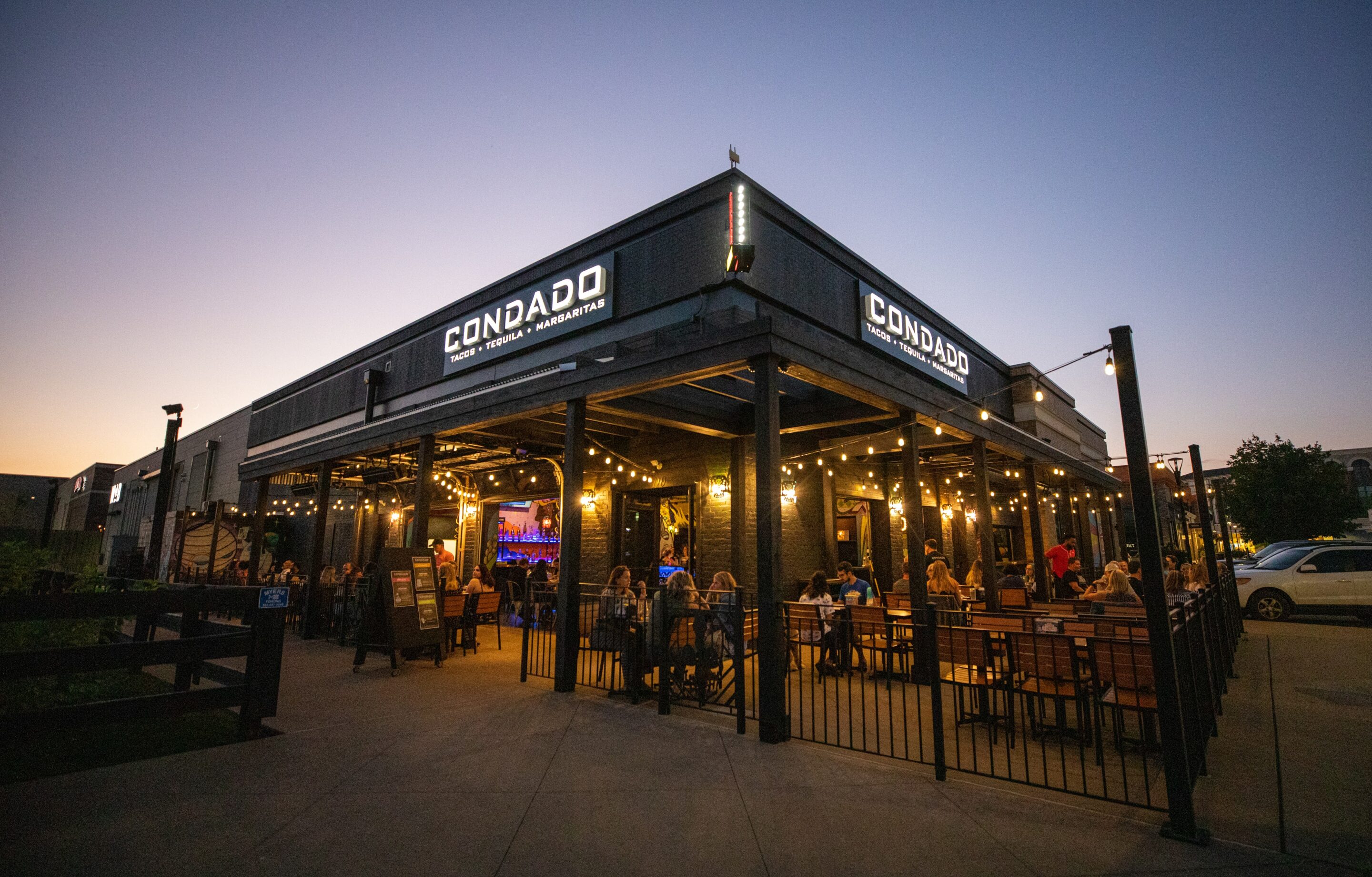
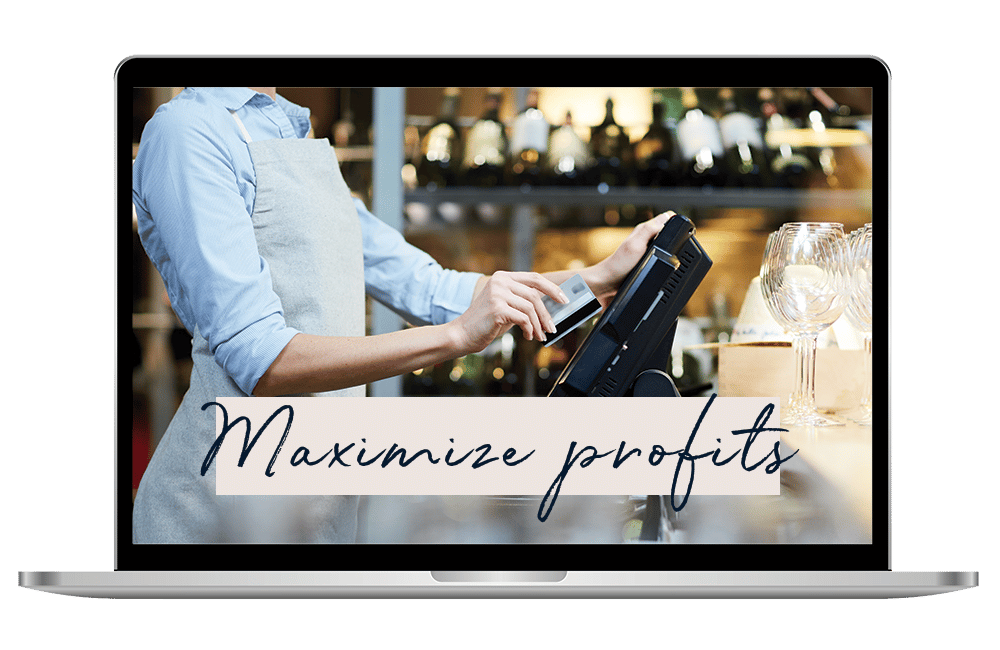
The three costly mistakes you could unknowingly be making?
Find out in this FREE guide and restaurant assessment specifically designed to reveal the unexpected hurdles standing between you and exponential business growth.
Thank You To Our Sponsors
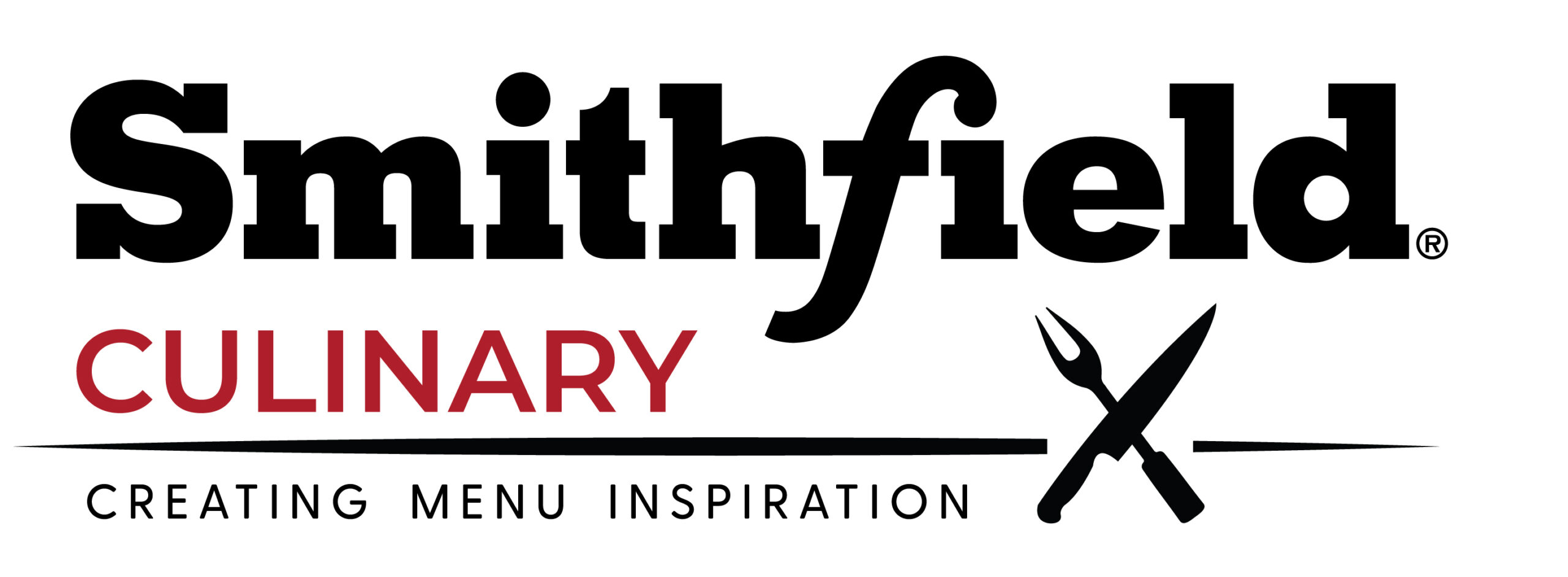
Inspiring Head-Turning Menu Creativity
Culinary Trends & Chef Inspired Recipes - Learn More
Did You Know That 7 out of 10 Adults Dine Out To Celebrate Birthdays?
You Can Easily Capture This Lucrative Business!
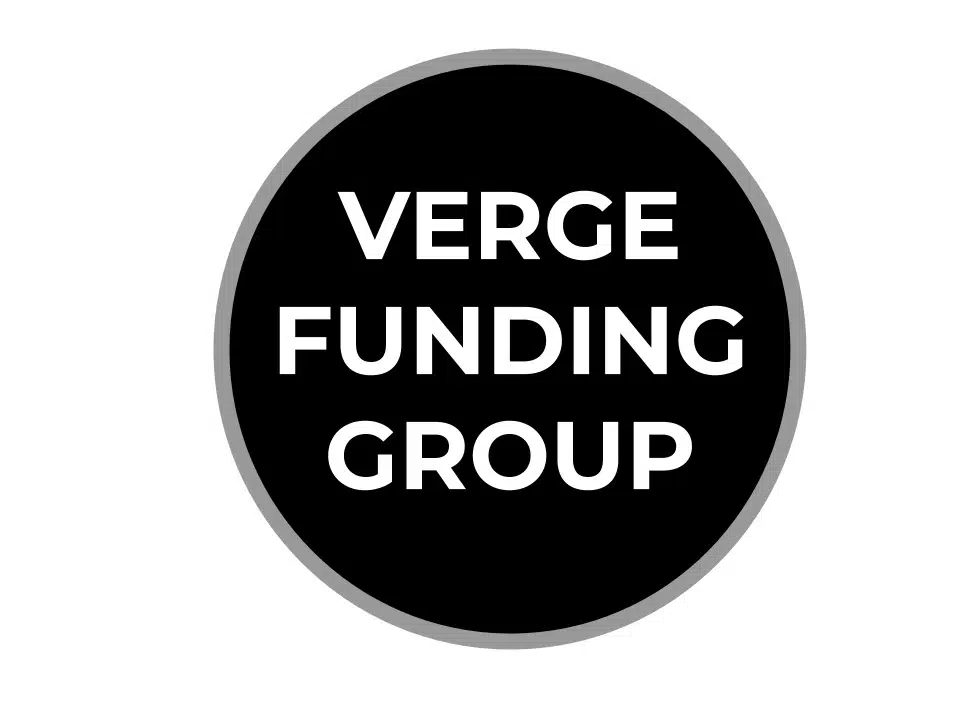
Find Out How Much Your Business Is Due Back from the ERC Program
Set Up a Call with Karen the Owner of Verge Funding
Want to become a podcast sponsor?
Please get in touch with Roger at roger@restaurantrockstars.com
